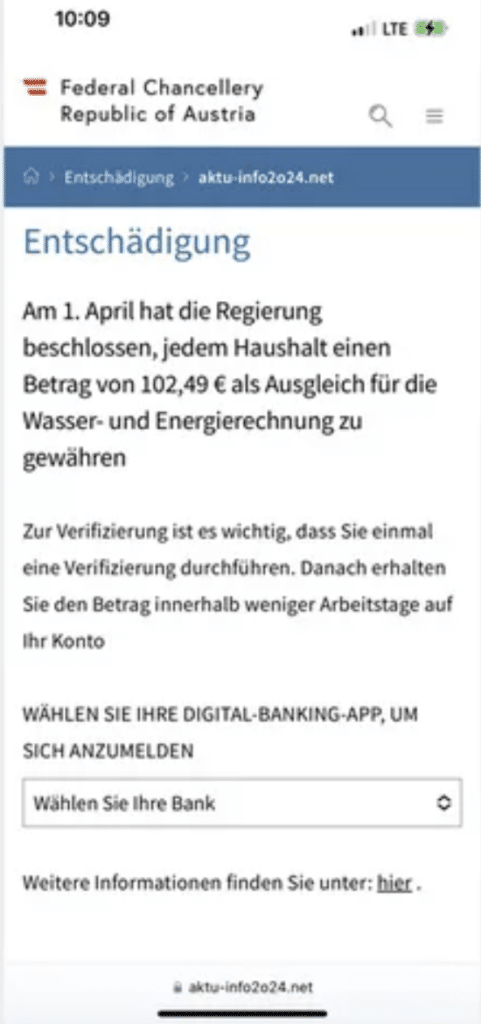Fraudsters use the Austrian Federal Chancellery as a cover to gain trust and lure victims into a trap.
The scam: Phishing SMS from the “Federal Chancellery of Austria”
The fraudulent SMS, which supposedly comes from the Austrian Federal Chancellery, claims that a message is waiting for the recipient.

However, the link it contains leads to a fake website.

This website offers victims the prospect of financial compensation for allegedly overpaying water and energy bills. In order to receive the alleged compensation, users should enter their bank details and complete verification. – This is a classic example of phishing, where fraudsters try to obtain sensitive data.
How you can recognize such fraud attempts and protect yourself
There are several warning signs that indicate a phishing attempt:
- The link: Always check the URL carefully. Official messages from authorities usually lead to trustworthy and easily recognizable web addresses.
- Unusual Prompts: No reputable organization would ask you to enter sensitive banking information on an unsafe platform.
- Phishing alerts: Search the Internet for unique keywords related to “phishing” to see if a similar scam is already known.
What to do if you have given out your data?
If you have entered your details on a fraudulent website, you should act quickly:
- Contact your bank: Notify your bank or financial service provider immediately to prevent possible unauthorized transactions.
- Make a report: Make a report to the police. This can help track perpetrators and warn other potential victims.
questions and answers
- How can I be sure that a message really comes from the Federal Chancellery?
Check the sender address and the included URL carefully. Official communication from authorities takes place via verified and secure channels. - What should I do if I'm not sure if a message is authentic?
Contact the relevant authority directly through the official contact channels to verify the authenticity of the message. - Is there a way to protect yourself from such scams?
Yes, regularly inform yourself about common fraud methods and use security software on your devices. - Where can I report such phishing attempts?
You can report such incidents to your local police station or via online platforms such as Watchlist Internet.
Conclusion
The threat of SMS phishing is constantly increasing. This makes it all the more important not to blindly trust messages that offer financial incentives or urgently ask for personal information. Instead, always question the authenticity of such communications and, if in doubt, contact the relevant authorities.
Source: Watchlist Internet
Find out more by subscribing to our newsletter . You are also welcome to take part in our online lectures and workshops to stay up to date with the latest cybersecurity developments.
You might also be interested in:
How to recognize fake websites
Beware of the trap: How online job offers can lead to crime
Fraud alert: Beware of calls with area code +91
Notes:
1) This content reflects the current state of affairs at the time of publication. The reproduction of individual images, screenshots, embeds or video sequences serves to discuss the topic. 2) Individual contributions were created through the use of machine assistance and were carefully checked by the Mimikama editorial team before publication. ( Reason )

